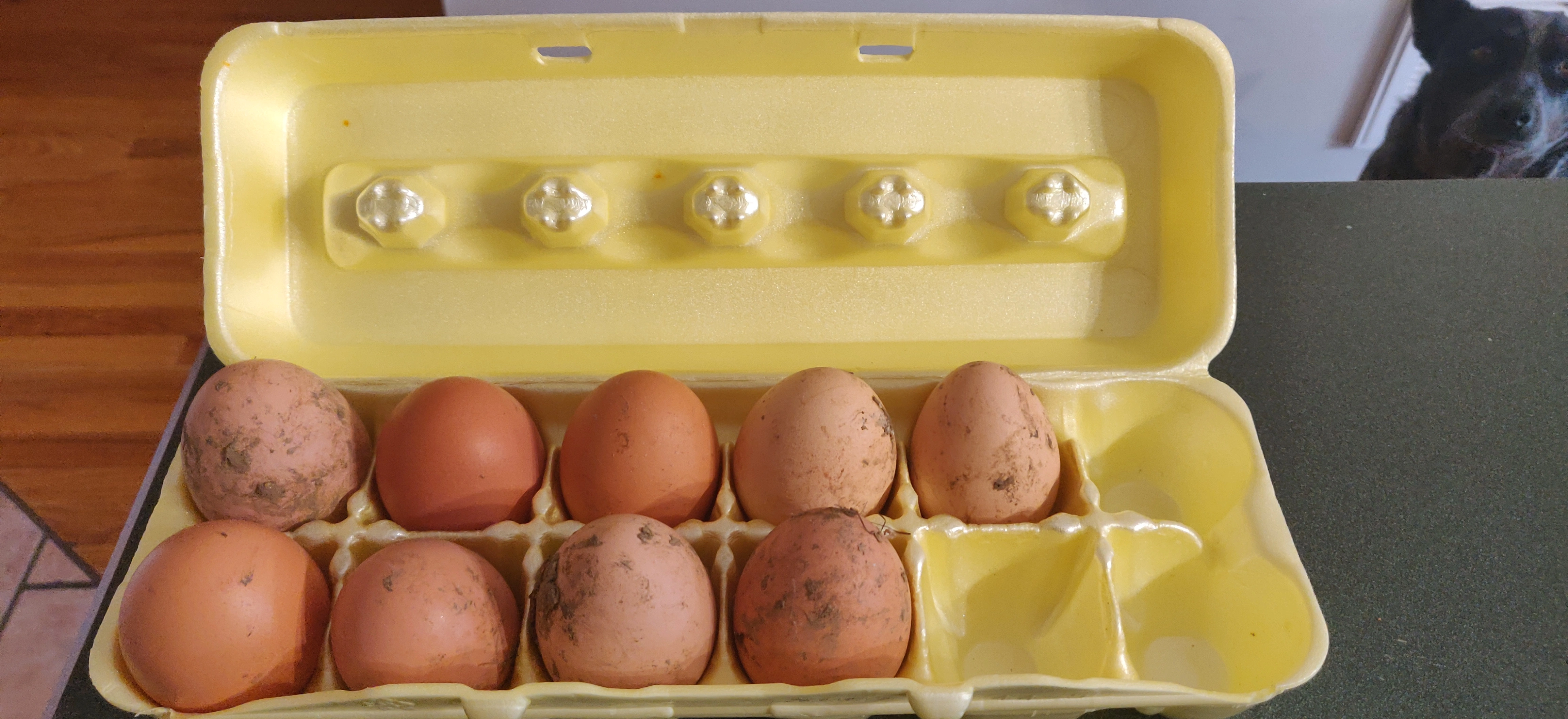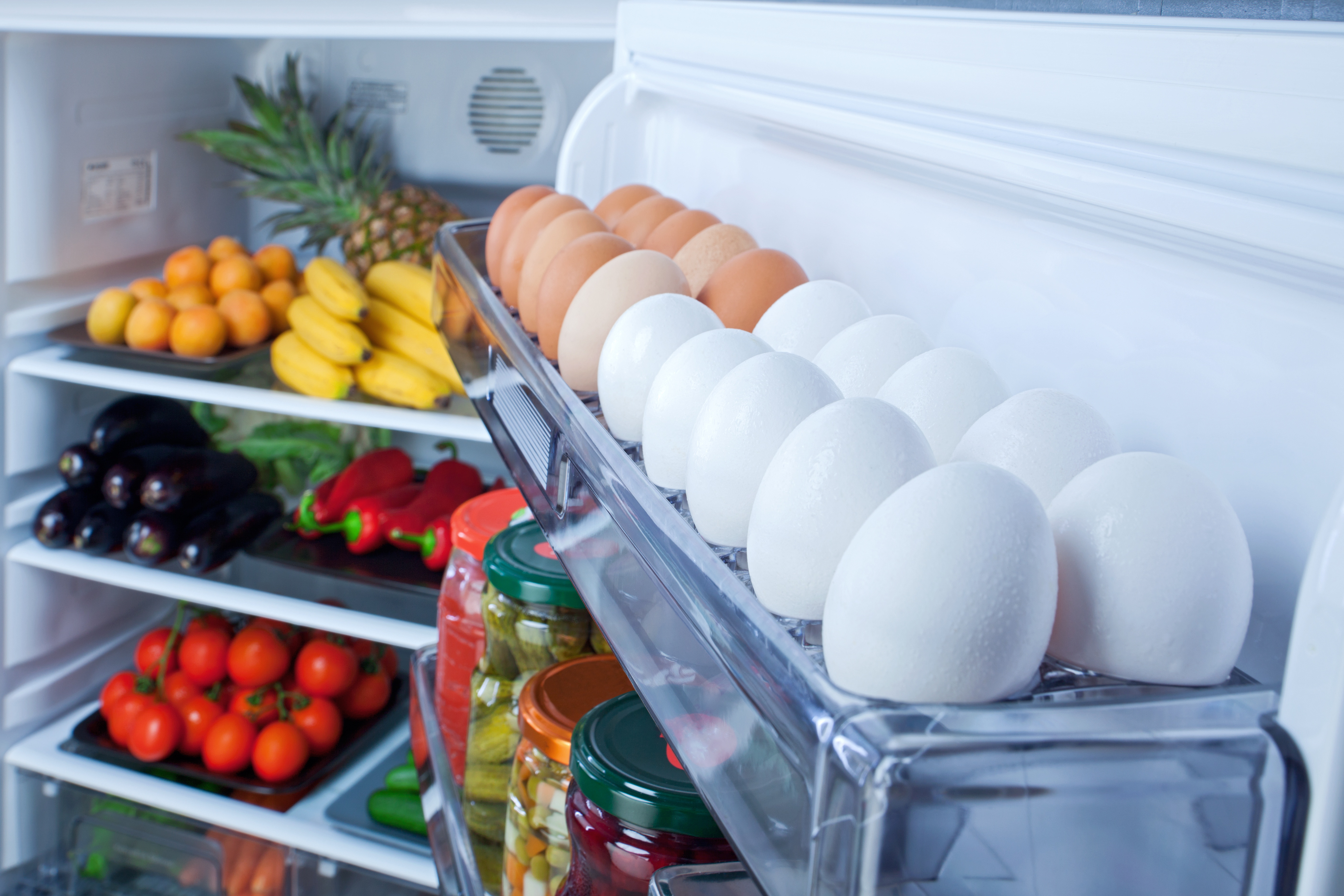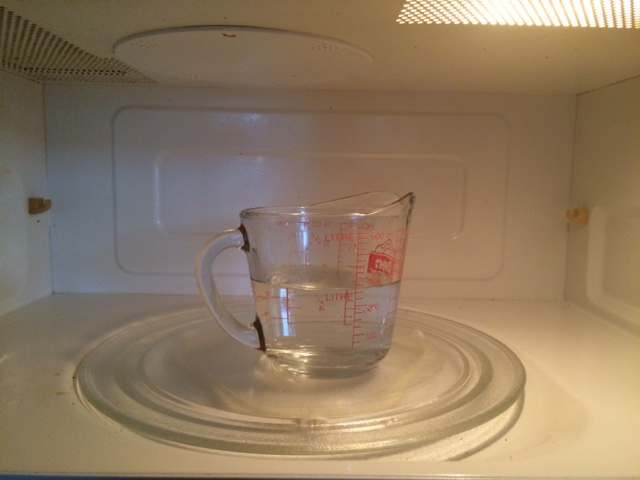I grew up raising chickens among other animals. Poop and feathers on eggs was the norm. This ‘50s processed white bread, white sugar, clean eggs, etc. that was the sign of “progress” I guess IMO has done more harm than good in some ways.
Removed by mod
I still don’t get why you wouldn’t still put those eggs on the refrigerator. They will stay fresher longer!
Fresh eggs at room temp will stay good for 2 - 4 weeks at room temperature, 3-6 months refrigerated. If you need to refrigerate fresh eggs, you have too many chickens
Eggs don’t instantly degrade from good to bad overnight. They slowly degrade with weakening membranes and what not. As I said, they stay freshER.
I get unwashed eggs from a farm whenever I can. I still put my eggs in the fridge. And the yolks stay nice and unbroken when making eggs over easy, as I like them.
And here I am, with my fridge-kept unwashed eggs, destroying each and every yolk with the spatula before flipping them over.
I love the juicy yolk exploding on the plate (or in my mouth). My other secret, besides fresh eggs, is to flip them without tools. https://youtu.be/OTlr2Y-nbc4?si=1uPHNAwHkV_HxV7T
Am American living in the city with 8 chickens. The only scary thing is seeing eggs in the market go for $10/dozen
Wow, that’s crazy. It’s €4.49/10 here tax included for the fancy free range, low volume farm ones from a not-cheap supermarket.
I’d love to see this city that only has 8 chickens in it
I don’t know what you’re doing, but the way you can turn a phrase around is remarkable. You’ve gotten a few chuckles outta me this morning.
I love you too 😊
Only 10? They’re $13 where i live
And here I thought $2 was a bit too much.
Farm fresh eggs here in Amish country go for $2/doz.
Miss living near the Amish. They have these cute big families with so many children and agricultural stuff for low prices. I would love to convince them to somehow some way homestead in my city.
Funny, as someone who works intimately with them I find myself distrusting them. They are great at putting on the “old timey, super genuine sweet Christian folk” persona but don’t get it wrong. Their ideology spreads like a cancer around here. They breed like crazy, buy up all the private land, displace other locals with their farms, eschew environmentally friendly agricultural practice to save money, their buggies destroy the roads and cause terrible fatal accidents. It’s not to say they’re all bad but they’re absolutely a highly insular cult and they have no problem turning on outsiders to further their society.
buggies destroy the roads
How? I’d always heard that heavier vehicles do more damage to roads, so I’d expect buggies to be on par with bicycles or maybe motorcycles.
cause fatal accidents
I’m curious about this one, too. Do they tend to drive erratically? I’d think their slower top speeds would make it easier to avoid accidents.
displace other locals with their farms, es
Meh I am not sure how people stuck on old tech are so much better at farming that they can outcompete modern farms. How bad at your job can you be to have your ass handed to you by the 17th century?
Kinda getting tired of the whole “my life sucks because I am lazy let me get angry at people who are actually successful”. Tall poppy syndrome is running rampant, especially in rural America. You can thank me for paying for your roads btw.
10$/dozen? Where?
My guy, I grew up on a chicken farm. This does not scare me.
Well obviously if you’re an actual chicken, it won’t. How was your cage growing up?
Why are people upvoting you, you aren’t funny, it feels like a 13 year old got ahold of someone’s account and is doing their first try at shitposting
What are you talking about? He’s just making polite conversation with a chicken.
Ah, the good 'ole chicken tenderoo.
Hold my shell, I’m going in
Am american and this:
 is what I have in my fridge right now. Rural living win.
is what I have in my fridge right now. Rural living win.Wait, why fridge? I thought they last at room temp if they still have the chicken butt juice. Do they last longer cold?
I still put farm fresh eggs in my fridge because it’s just a lot more convenient to store eggs in the fridge than on my counter where I have more limited space
I don’t get this at all. Isn’t your fridge much smaller than your counter space?
My fridge is designed to store food and has multiple shelves and drawers. My counters are a flat surface area and I’d rather keep them clear for active uses like cutting, prepping, etc.
There are also appliances competing for space on the counter like coffee machines
I guess there’s the pantry but it’s also just that I’m used to keeping them in the fridge and it’s not like it hurts them to go in the fridge.
Anyway, point is it’s really not that weird to keep them in the fridge
Yeah I suppose I could store them at room temp, but I figure they last longer in the fridge and I’m not really hurting for space.
Would definitely lick those clean, 10/10
Are you my dog?
I can be if you want me to.
Down boy, or you’ll get locked in the basement again
OP, that’s what it would’ve looked like. Your eggs been industrially washed. What a moron is that OP.
And a pack of 10, not 12.
what’s wrong with a pack of 12?
It’s comfortable for Americans but unheard of in many European countries. The point of this post is to make them uncomfortable.
I live in Europe and I’ve seen packs of 4, 6 (most common), 8, 10, 12. It’s not unheard of at all.
In Norway I’ve only seen eggs sold in packs of 6, 12, 18, or 24. As far as I can remember, anyway.
wow 24 is huge!
Where I used to live there were 6, 10, 15, and huge packs of 25. Recently 9 eggs packs started appearing (I could almost bet the price is same as 10)
15? Are those arranged 3x5? Is the 25 package square? I’ve only seen packages arranged as 2xN.
15 is 3×5, as for 25 I stand corrected, those are 30 arranged 5×6 (I counted several times and then wrote an incorrect number 😕)
who needs that many eggs lol, and why wouldn’t they simply buy 3 packs of 10
Well, I never bought eggs outside the Czech Republic, Germany and Romania, and they were only available in multiples of 10.
They use metric egg cartons, we use freedom cartons.
7/13th of an ounce of eggs pls
In Spain it is also a dozen (12).
I don’t really know if there are laws about not selling eggs like this. Are there? I understood the practice of washing and sterilizing eggs came about as a marketting thing, b/c Americans tend to buy based on superficial appearance, and washed eggs sold better.
Is egg-washing mandated?
About 60 percent of the eggs sold in the United States come from processors who participate in USDA’s grading service, voluntarily paying to have their eggs graded so the eggs can display a “USDA Grade A” or “AA” shield on their cartons. The grade is based on qualities that can be observed in the shell, yolk, and egg white when the egg is inspected with lights and other specialized equipment. Specifics on egg-grading criteria can be found here.
Egg processors who participate are required to spray-wash their eggs with warm water and use a sanitizing rinse and air-drying techniques specified by USDA’s Agricultural Marketing Service (AMS).
https://tellus.ars.usda.gov/stories/articles/how-we-store-our-eggs-and-why
FYI multiple studies have found that there is no safety benefit to washing. It just looks nicer, and people think it’s safer.
Thanks, that confirms my understanding, although I’m surprised the participation rate is as low as it is. That’s really interesting, thanks!
Yeah, as an American I’m surprised it’s only 60 percent. Pretty much anything I’ve ever seen available to me has been washed/graded/refrigerated. Maybe farmer’s markets? But no way do they have 40 percent market share. I’ve occasionally had friends with coops so I’m not unfamiliar with having shelf stable eggs, though.
At this point I think the thing that’d freak out Americans the most is the whole thing about not needing to refrigerate. It’s ingrained now.

Here’s a pic of some washed eggs in a refrigerator to scare the Europeans.
Bonus:

Microwaved water for tea.
As an American I don’t condone this practice of microwaving the water, except in extreme circumstances.
Edit: as a typical American, I’ve realized that I implicitly assumed OP is American, d’oh.
This gives me the same vibe as Andrew Tate boasting about not recycling the pizza box. Not scared, sad
Yo why are you keeping bananas in the fridge?
I’m pretty sure that’s a stock image so I don’t think that’s a pic of anyone’s legit fridge.
But to answer your question, you can keep bananas on the counter until they reach your preferred level of ripeness and then put them in the fridge to slow down the ripening process so you have a few more days to eat them before they turn to complete mush. I do it all time to ensure I always have bananas around at my preferred level of ripeness.
They brown more in the fridge. If anything cold speeds up the banana going gross.
Avocados work the way you say. I wouldn’t do it to a banana
They brown more in the fridge. If anything cold speeds up the banana going gross.
You mean it speeds up the time until they’re ready to be banana bread? 😋
Microwaved water for tea.
This sounds so painfully long
It takes less time than even an electric kettle.
It kind of depends on the “quality” of the electricity that runs your domestic property. In the UK there is some serious juice coming through the socket and the kettles there go hard and fast.
Yeah, I shell out for the premium electricity, the 99% electrons. The 95% stuff is fine but I have a lot of expensive devices; I want them to run as fast as possible.
Damn. I didn’t know they still manufactured the 95% electrons stuff. Probably left over stock that they sell at discounted prices.
Bruh I’m not even European but that measuring cup got me shook.
Those eggs look almost artificial. Bleugh.
They might be, food photography is weird
I also just grabbed a random ass image off a search; it might be AI generated for all I know!
can you imagine searching for something on google and it just ai generates images on the fly
What kind of monster stores bananas in the fridge?
IKR? They go in the freezer so they can be dipped in chocolate. 😋
There’s always money in the banana stand
Once they’ve reached your desired ripeness you can slow down them getting overripe in the fridge.
And tomatoes!!! Might as well eat ice cubes at that point
I kinda prefer cold tomatoes on my tacos than room temp ones, and I mostly use it for pico de Gallo, which is kept in the fridge anyway, so those I do store in the fridge.
refrigerators keep things chilled, not frozen. you’re thinking of a freezer.
Europeans don’t have freezers, they store their perishables in Angela Merkel’s minge.
OH MINGEY
Yeah, and I feel like someone’s gonna slam that door one day and get egg all over their bananas.
If “get egg all over their bananas” wasn’t an euphemism before, I’m starting it now.
Bananas in the US get washed and lose their protective coating so it’s fairly normal to see them in the fridge in US homes.
Just out of curiosity, taking into account feed and care for the chickens, how much would you say each egg costs?
we
raisekeep chickens. did the calculation a couple years ago (eggs/week / feed/week) and it was essentially break even, but I think the eggs are better (store bought eggs have super pale yolks). We feed them a mix of feed and kitchen scraps (trimmings of produce etc). Now its a good price from what I read in the news, but if you include labor, its probably not worth it or you would pay yourself next to nothing.Oh yeah, I consider myself unpaid labor so that’s ok. XD Do you mean that you also sell the chickens? Or just that you raise them from chicks?
sorry, misspoke. we keep chickens for eggs.
But you get chickems! They are their own reward.
And plus you’ve got fair-trade ethically-sourced cruelty-free local eggs. Those aren’t cheap.
You can wash eggs at home (only) if you immediately use them afterwards.
I keep dropping them in my rush from the sink to the stove.
I want my eggs washed because I deal with enough shit, literal and metaphorical, in my every day life, that I dont want to start my day off with it during breakfast.
You don’t have to eat the shit, you know
I cant help it, reminds me so much of your mothers cooking.
My mother died of cancer while I watched. I was 13.
It was a relief, because her cooking was shit
Why would this scare Americans? We can get farm fresh unwashed eggs here too.
Most of us don’t and many of us are skeeved out by this. I recognize that it’s stupid and these eggs are fine, but it still makes me feel gaggy looking at them.
It’s a joke, ya numpty
You know, like your healthcare system
You sound jaded. Who hurt you?
Maggie Thatcher. Next question
It’s a bad one, you Dumpty.
Fuck me I’m trying here
like we have a choice bro we are all corporate slaves with no backbones trying to not be homeless and die on the street while some shithead iNfLuEnCeRs records our last moments for a few likes.
Remember to like and subscribe for more homeless suffering!
Today’s sponsor is Empathy, or rather a complete lack of it! Buy now!
Eggs are shelf stable? How long do they last on the counter?
Two hundred and fifty years, give or take
deleted by creator
Unwashed eggs are shelf stable, they last for a few weeks at room temp. Washed eggs, like you’d get at an American grocery store, absolutely need to be refrigerated.
What if you do the bad/good test with water in a bowl? Do you have to refrigerate them after? Or is that not “washing”?
By washing they mean chemically. Usually involving bleach
There’s plenty of things to make fun of the US for, but this isn’t one of them.
Yeah I know it’s tongue in cheek, but the mocking should really go the other way, haha. Look at our washed American eggs that scare the Europeans who are used to two orders of magnitude higher incidences of salmonella:
“Overall, egg contamination from industrial systems has been reported to be 0.005% in the United States, 0.37% in Europe, and between 0.5% and 5.6% in China”
That’s not the number you’re looking for with “industrial systems” they mean keeping hens in batteries and that’s outlawed in the EU, has been since 2012 (though the actual phase-out took longer). So you’re probably looking at maybe Serbian, Belorussian, and Albanian stats.
Overall the study you’ve cited is not the right one to look at as they’re comparing different methods of keeping chickens, it’s not focussed on hashing out regional differences much less the wash vs. don’t wash issue.
Fair enough (it was actually way more countries, because I found that the study they quoted quoted a study, so it included Spain, Portugal, others except the UK and Nordic countries), though the study I linked to actually found 2 cases in the “alternative” keeping of hens compared to zero in battery cages. Wasn’t statistically significant, but still the point is the washing and refrigeration of eggs greatly lowers the chance of salmonella risk. Animal welfare is sort of a separate issue, though at least it’s getting addressed in the EU.
It’s just not big enough of an issue to mandate universal vaccinating: Any salmonella are generally on the shell, not actually infecting the egg. At least in Germany only flocks >350 animals need to be vaccinated.
Also it has to be said that European cuisine is actually quite risky when it comes to salmonella: Proper Tiramisu uses raw egg yolk, proper mousse au chocolat raw egg whites, and a carbonara might contain both semi-raw (depending on how you like it). But it’s also well-known that you use fresh eggs for those as the fresher the eggs the less bacteria there will be on there even if infected and it’s not like people keel over from a single bacterium. Also don’t feed those dishes to small kids or the elderly.
German press reports that authorities say that bacteria loads (not just salmonella) are pretty much similar comparing conventional (that’s barn and free range) vs. organic (free range deluxe) eggs (9 vs. 6 vs. 4 hens per m2), with a nod towards organic eggs as those don’t come with bacteria resistant to antibiotics.
























